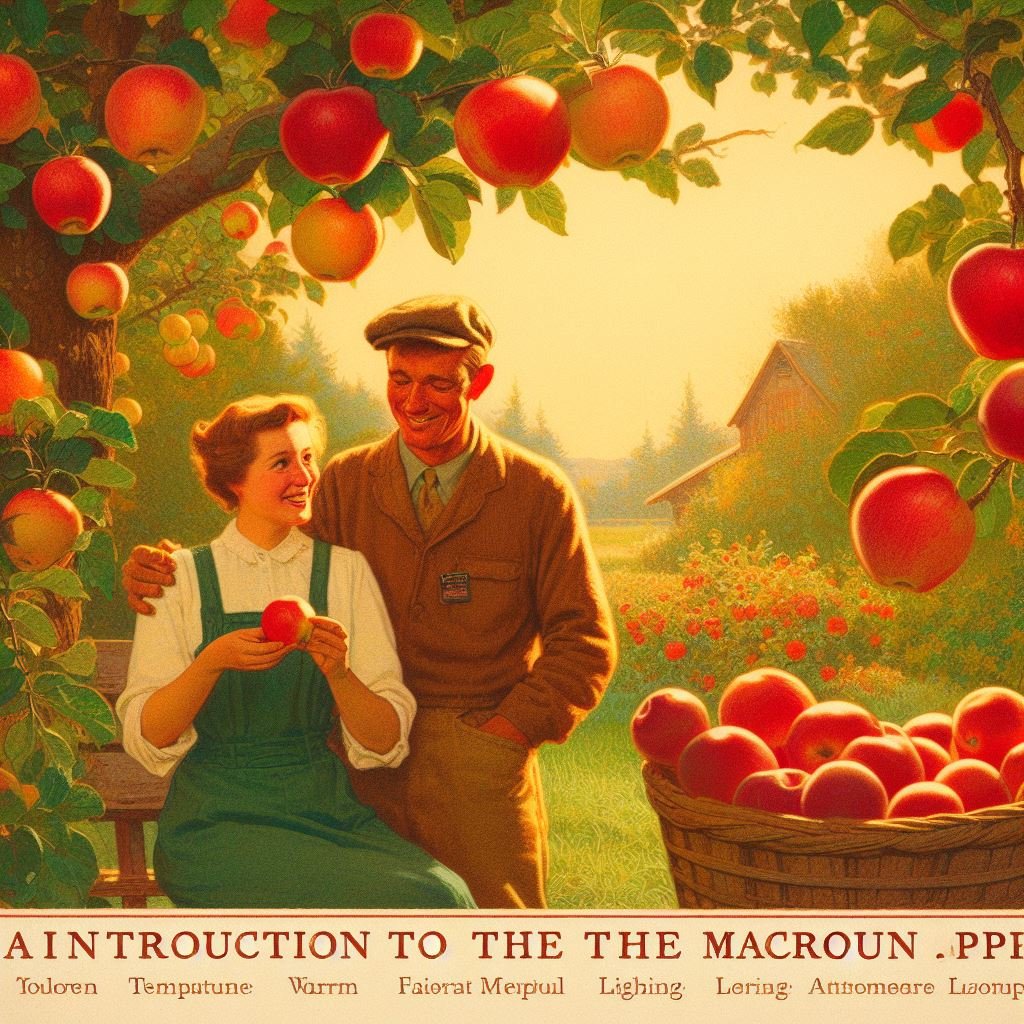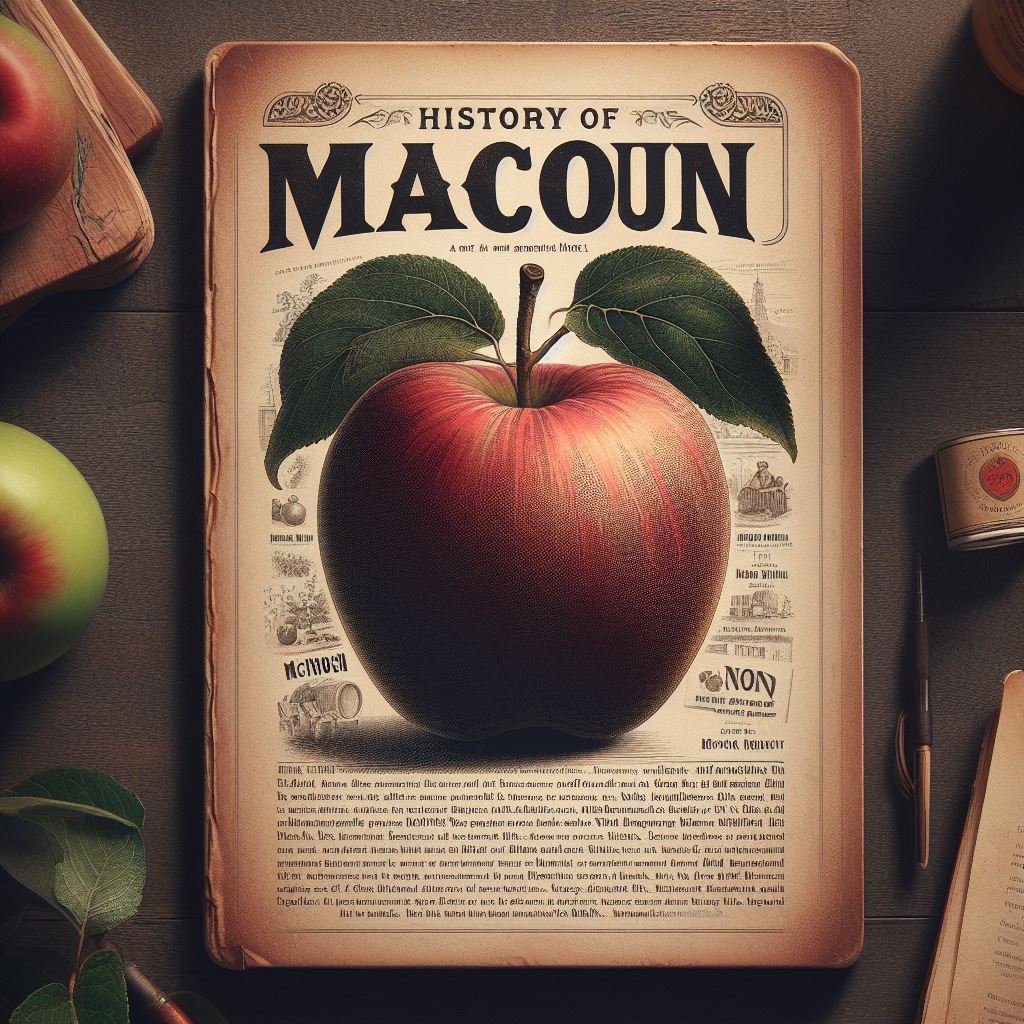Are you tired of the same old, boring apple varieties? Look no further! The Macoun Apples is here to tantalize your taste buds and satisfy your snacking cravings. Bursting with flavor and packed with essential nutrients, this delightful fruit is not only a treat for your palate but also a powerhouse of goodness for your body. In this blog post, we will delve into the world of the Macoun Apple, exploring its origins, unique characteristics, and why it should be your go-to choice when hunger strikes. Get ready to embark on an apple adventure like never before!
Introduction to the Macoun Apple
The Macoun apple, pronounced as “muh-KOON”, is a flavorful and versatile fruit that has been a favorite among apple lovers for over a century. Originating in New York, USA, this apple was named after its breeder Richard Wellington Macoun and was first introduced to the market in 1923.

Macoun Apple Taste & Appearance
The Macoun apple is characterized by its vibrant red color with streaks of green and yellow. It has a medium size that fits perfectly in your hand and features a round shape with slightly flattened ends. The skin of the Macoun apple is thin but firm, making it easy to bite into without being too tough.
When it comes to taste, this variety offers a unique blend of sweet and tart taste. The initial crunch reveals a juicy white flesh that’s crisp yet tender. Its high sugar content gives it a sweet taste, while its acidity adds just the right amount of tanginess, creating an irresistible flavor profile that keeps people coming back for more.
History and Origin of the Macoun Apple
The Macoun apple is a beloved variety that has been satisfying taste buds for over 100 years. Its rich, sweet flavor and crisp texture make it a popular choice for snacking, baking, and cooking. But where did this delicious fruit come from? Let’s take a journey back in time to explore the history and origin of the Macoun apple.
History of Macoun Apple
The story of the Macoun apple begins in 1909 with Canadian horticulturist W.T. Macoun. He was on a mission to create a new variety of apple that would thrive in the harsh climate of eastern Canada. After years of experimentation, he successfully crossed two varieties – McIntosh and Jersey Black apples – to produce what we now know as the Macoun apple.

Named after its creator, the first Macoun trees were planted in Geneva, New York at Cornell University’s Agricultural Experiment Station. It wasn’t until 1923 that they were commercially released by Stark Brothers Nursery in Missouri. From there, their popularity began to spread throughout North America.
Origin of Macoun Apple
One unique aspect of the origin of the Macoun apple is that it was not created for commercial purposes. Unlike many other popular varieties like Red Delicious or Granny Smith, which were specifically bred to be visually appealing and have a longer shelf life, the Macoun was simply meant to be a tasty treat for local farmers.
But word quickly spread about this new variety with its exceptional flavor profile and soon enough, it became sought after by consumers all over North America. In fact, the Macoun was so well-loved that in 1932, it was officially named the official apple of the state of New York.
Today, Macoun apples are primarily grown in the northeastern United States and eastern Canada. They are still a popular choice for home gardeners and can also be found at farmers’ markets and specialty grocery stores.
In recent years, there has been an effort to revive interest in heritage apple varieties like the Macoun. As consumers become more interested in supporting local and sustainable agriculture, these unique and flavorful apples are experiencing a resurgence in popularity.
So next time you bite into a crisp, sweet Macoun apple, remember its humble beginnings and the journey it took to become one of North America’s most beloved fruits.
Nutritional Benefits of the Macoun Apple
The Macoun apple is not only known for its delicious taste, but it also offers a plethora of nutritional benefits. This crisp and juicy fruit is packed with essential vitamins, minerals, and antioxidants that can contribute to overall health and well-being.

1. Rich in Fiber
One medium-sized Macoun apple contains about 4 grams of fiber, making it a great choice for promoting digestive health. Fiber helps regulate bowel movements, prevents constipation, and can even aid in weight management by keeping you feeling full for longer periods.
2. High in Vitamin C
Just like other types of apples, the Macoun variety is an excellent source of vitamin C. In fact, one medium-sized Macoun apple provides approximately 14% of the recommended daily intake of this important nutrient. Vitamin C plays a crucial role in maintaining a healthy immune system and also acts as an antioxidant to protect cells from damage caused by free radicals.
3. Good Source of Potassium
Potassium is an essential mineral that helps regulate blood pressure levels and maintain heart health. The Macoun apple contains around 150 milligrams of potassium per serving, making it a good choice for those looking to increase their intake of this vital nutrient.
4. Low Calorie Snack
For those who are watching their calorie intake or trying to manage their weight, the Macoun apple makes for an ideal snacking option. One medium-sized apple contains only about 90 calories but provides satiating fiber and nutrients that can help keep hunger at bay between meals.
5. Antioxidant Powerhouse
The Macoun apple is rich in antioxidants, which are compounds that help fight off harmful free radicals in the body. These antioxidants are essential for maintaining overall health and may also have anti-inflammatory properties that can benefit conditions like arthritis and heart disease.
Macoun apple trees
Macoun apples are a well-known and beloved variety of apple that has been enjoyed by many for generations. These crisp, juicy fruits have a unique flavor that sets them apart from other types of apples. But did you know that you can grow your own Macoun apples at home? That’s right, with the help of macoun apple trees, you can have a never-ending supply of these tasty treats in your own backyard.

Now let’s dive into how to grow your very own macoun apple trees. These trees require well-drained soil and plenty of sunlight to thrive. Make sure to choose a sunny spot in your yard or garden to plant your tree. It’s best to plant macoun apple trees during early spring when the ground is soft enough to dig easily.
How to Select and Store Macoun Apples
When it comes to selecting and storing Macoun apples, there are a few important factors to keep in mind. These steps will ensure that you get the freshest, tastiest apples possible.

1. Look for Firm and Smooth Apples
When choosing Macoun apples, it’s important to look for firm and smooth ones. Avoid picking apples that have soft spots or bruises as they may not be as fresh and could spoil quickly. The skin of the apple should also be free from blemishes or wrinkles.
2. Check the Color
Macoun apples are known for their vibrant red color with green undertones. When selecting an apple, make sure the color is consistent all over. Avoid any pale or dull-looking apples as they may not be ripe enough to eat.
3. Smell the Apple
Believe it or not, but smelling an apple can give you an indication of its freshness. A ripe Macoun apple should have a sweet aroma when held close to your nose.
4. Pick Apples with Stems Attached
The stem of an apple plays a crucial role in preserving its freshness and flavor. When picking out Macoun apples, choose ones with stems still attached rather than those that have been pulled off.
5. Choose Seasonal Apples
Macoun apples are typically available during late September through November in most parts of the United States. Choosing seasonal apples ensures that you’re getting them at their peak flavor and nutritional value.
6 .Store Them Properly
Proper storage is key to keeping Macoun apples fresh for as long as possible. Store them in the crisper drawer of your refrigerator, away from other fruits and vegetables. This will help maintain a cool and consistent temperature, preventing them from spoiling quickly.
7. Keep Them Dry
Apples can release moisture as they ripen, which can cause them to spoil faster. To prevent this, make sure to store your Macoun apples in a dry environment. If you notice any condensation or moisture on the apples, wipe it off with a paper towel before storing them back in the refrigerator.
8. Use Them within 2 Weeks
Macoun apples are best eaten within two weeks of purchasing them. After this time frame, they may start to lose their flavor and texture.
Delicious Ways to Enjoy Macoun Apples as a Snack
When it comes to healthy and delicious snacking options, the Macoun apple is a standout choice. With its perfect balance of sweetness and tartness, crisp texture, and nutrients, it’s no wonder that this variety has become a fan favorite among apple lovers.

But how can you enjoy Macoun apples as a snack? Here are some delicious ways to incorporate this tasty fruit into your daily snacking routine:
- Simply sliced: Sometimes, the best way to enjoy an apple is by simply slicing it up and eating it as is. The Macoun’s firm flesh makes it perfect for slicing into thin wedges or rounds. For an extra burst of flavor, try sprinkling some cinnamon or nutmeg on top of your slices.
- Apple “sandwiches”: Take your apple slices to the next level by creating mini sandwiches with them. Spread some nut butter (peanut butter, almond butter, etc.) in between two slices and add a sprinkle of granola or raisins for added crunch and sweetness.
- Baked apple chips: If you’re craving something crunchy but still want to keep things healthy, try making baked apple chips with Macoun apples. Slice the apples thinly and bake them in the oven at a low temperature until they become crispy. You can also sprinkle them with cinnamon or other spices before baking for added flavor.
Healthier Alternatives to Traditional Snacks using Macoun Apples
Macoun apples are not only incredibly delicious, but they also offer a variety of health benefits. And what better way to enjoy this tasty fruit than by incorporating it into your snacks? In this section, we will explore some healthier alternatives to traditional snacks using Macoun apples.
1. Apple Chips
Instead of reaching for a bag of greasy potato chips, why not try making your own apple chips? They are easy to make and provide a satisfying crunch without all the added unhealthy fats. Simply slice your Macoun apples thinly and bake them in the oven at 350 degrees Fahrenheit for about 20 minutes. You can also sprinkle some cinnamon or other spices on top for added flavor.
2. Apple Dip
Dips are often high in calories and unhealthy ingredients, but you can make a delicious and healthy dip using Macoun apples as the main ingredient. Simply blend chopped apples with Greek yogurt, honey, and a dash of cinnamon for a creamy and nutritious dip that pairs well with apple slices or whole grain crackers.
3. Apple Slices with Nut Butter
Another great snack option is pairing sliced Macoun with nut butter such as almond or peanut butter. This combination provides a balance of healthy fats, protein, and fiber from the apple’s skin. It’s also a great post-workout snack that will keep you feeling full and satisfied.
Fun Facts and Trivia about the Macoun Apple
| Point | Facts | Information |
| 1 | Named after a Canadian horticulturist | The Macoun apple was developed in 1909 by Dr. William Tyrrell Macoun, a Canadian horticulturist who worked for the Agriculture Canada Research Station. |
| 2 | A cross between two popular apples | The Macoun apple is a hybrid of two other popular apple varieties, the McIntosh and Jersey Black varieties. |
| 3 | Only available for a limited time | Due to its short shelf life, the Macoun apple is only available from October to January in most regions, making it a highly sought-after seasonal treat. |
| 4 | Official state fruit of New York | In 1976, the Macoun was declared as the official state fruit of New York, where it is widely grown and enjoyed. |
| 5 | Special flavor profile | The Macoun apple has been described as having a uniquely sweet and tart flavor with hints of strawberry and raspberry notes. |
| 6 | Popular choice for baking | With its crisp texture and well-balanced sweetness, the Macoun apple is often used in recipes for pies, tarts, cakes, and other baked goods. |
| 7 | Good source of fiber | One medium-sized Macoun apple contains approximately 4 grams of fiber, which helps promote digestive health and can also aid in weight management. |
| 8 | Rich in antioxidants | Like most apples, the Macoun variety contains high levels of antioxidants such as quercetin and catechin that help protect the body against cellular damage and disease. |
| 9 | Not suitable for long-term storage | Due to its delicate nature, the Macoun apple does not store well for extended periods of time and is best consumed within a few weeks of harvest. |
| 10 | Popular in New England | The Macoun is especially popular in New England, where it is often used in traditional fall dishes such as apple cider and apple butter. |
| 11 | Named one of the best apples for eating | In a blind taste test conducted by “Cook’s Illustrated” magazine, the Macoun apple was ranked as one of the top three apples for eating out-of-hand. |
| 12 | Smaller than other varieties | The Macoun is typically smaller than other common varieties such as Red Delicious or Gala apples, but it makes up for its size with its intense flavor. |
| 13 | Can be difficult to grow | While loved by many, the Macoun apple can be challenging to grow due to its susceptibility to certain diseases and pests, making it less commonly found in commercial orchards compared to other varieties. |
| 14 | Considered a “dessert” apple | Due to its sweet flavor profile, the Macoun apple is often considered a “dessert” apple rather than a cooking or baking variety. |
Conclusion: Why You Should Add Macoun Apples to Your Snacking Routine
Incorporating Macoun into your snacking routine is an excellent choice for both taste and health benefits. These delicious apples are not only a satisfying and convenient snack option, but they also pack a nutritional punch.
Firstly, the crisp texture and sweet-tart flavor of Macoun make them a delight to eat. They are perfect for satisfying that mid-day craving or for curbing hunger between meals. The juicy flesh of these apples provides a refreshing burst of flavor with every bite, making them an enjoyable treat for all ages.
Moreover, Macoun are rich in essential vitamins and minerals that can contribute to overall health and well-being. They contain high levels of vitamin C, which plays a crucial role in supporting our immune system, promoting collagen production for healthy skin, and aiding in iron absorption.
But the benefits don’t stop there – research has shown that regularly consuming Macoun may also have positive effects on heart health. This is due to their high levels of antioxidants such as quercetin and kaempferol, which can help reduce inflammation in the body and protect against chronic diseases like cardiovascular disease.
FAQs
What is a Macoun apple?
A Macoun apple is a type of apple that was developed at the New York State Agricultural Experiment Station in 1909. It is named after its original breeder, Richard Wellington, who combined two other varieties to create this sweet and juicy apple.
How does it taste?
Macoun apples are known for their unique flavor that combines sweetness with a slight tartness. They are often described as having a honey-like aroma and a crisp texture, making them perfect for snacking.
When is the best time to eat Macoun apples?
The prime season for Macoun apples is from September to early November, making them readily available during the fall months. However, you can find them in some stores year-round as they have a good storage life compared to other apple varieties.
Are Macoun apples good for snacking?
Absolutely! In fact, they are one of the best choices for snacking due to their sweet and flavorful taste and crisp texture. Plus, they are also packed with nutrients that make them a healthy option for satisfying your cravings.
What nutrients do Macoun apples contain?
Macoun apples are rich in antioxidants such as flavonoids and polyphenols, which help protect against diseases like cancer and heart disease. They also contain dietary fiber, vitamin C, potassium, and various other vitamins and minerals essential for maintaining overall health.
Can I use Macoun in baking or cooking?
Yes, Macoun apples can be used in baking and cooking. They hold their shape well when cooked, making them perfect for pies, tarts, and cakes. They also add a delicious flavor to savory dishes such as salads, sauces, and stews.





